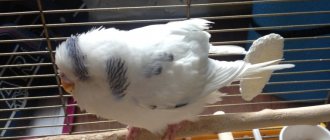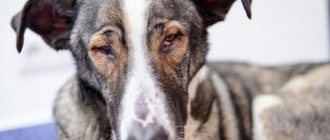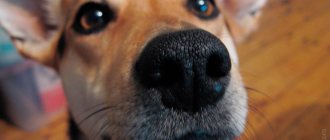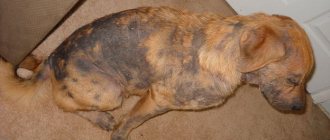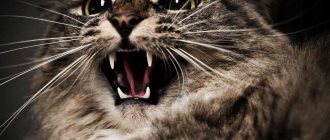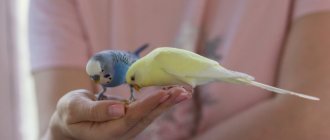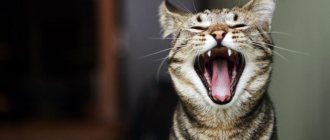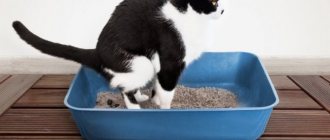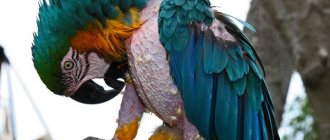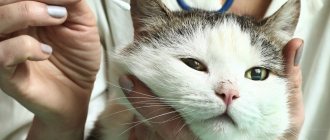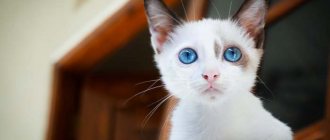Reasons for scratching
Feather grooming is a normal process for a parrot, but sometimes symptoms of itching can indicate a serious illness. Why is my parrot itching? And what should you do in this case?
Shedding
Twice a year the parrot molts. During this period, he begins to itch a lot. In this way, he helps himself quickly get rid of old feathers so that new ones can grow.
The main signs of shedding:
- feathers are lying everywhere;
- the appearance of stumps on the body;
- old feathers without traces of blood.
Stress
Yes, indeed, itching and loss of feathers when the molting period has recently ended are the consequences of stress. Parrots, like other animals, are afraid and even nervous. If your parrot is constantly itching and trembling, your pet may have been seriously shaken by something. For example, prolonged loneliness, separation from a couple. To calm your parrot, simply pay more attention to it.
Dry air
The skin of birds, just like the skin of people, needs to be moisturized. The parrot itches due to dry skin. He develops itching and feather loss. What to do in this case? Simply increase the air humidity in the room where the parrot is, or periodically spray the bird with water from a spray bottle.
Fungal diseases
Itching is caused by various fungal diseases of the parrot's skin. The bird also experiences loss of feathers with blood, formation of growths and crusts on the body and beak, and peeling. You will not be able to make an accurate diagnosis, so you need to contact a veterinarian.
Scabies mite
Another reason that a parrot itches is an infestation with scabies mites. This can occur as a result of poor quality grain mixtures, lack of cage treatment, and purchased toys. Or the pet itself is a carrier of the tick, interacting with various external factors. If the problem is not identified in time, the parrot's beak may become deformed, its appetite may deteriorate, and it will eventually die.
Causes of itchy skin of a bird can also be the lack of essential vitamins in the diet, poor room lighting, and decreased immunity.
Scratching as a symptom of disease
If your budgie is constantly itching or its behavior differs from its usual state, this may indicate the presence of diseases.
Budgerigars often itch due to the following diseases:
- Infection with parasites - mites or feather eaters.
- Fungal disease.
Only an ornithologist can make an accurate diagnosis, but the owner can make a preliminary conclusion when examining the bird.
Ticks can be seen visually; their presence is indicated by small dots measuring 1-2 mm. Signs also include the presence of growths, peeling, and porosity on the body.
Feather eaters feed on feathers, so budgerigars suffer from severe itching.
The pet may lose sleep, lose appetite, be restless or lethargic. When you cannot see parasites with the naked eye, you can use a magnifying glass.
Beetles resemble lice, are brown in color and have an elongated body.
If you look at the fallen feathers, you can see holes that have been eaten away.
Important: if left untreated, budgies begin to go bald and itch incessantly.
It is difficult to determine a fungal disease on your own; this can only be done by a doctor.
How can I help you?
Let's consider what to do with a parrot for various reasons for the appearance of scabies. If you are stressed, try to calm your pet down: buy him a new toy, talk to him, give him more of your attention.
If the whole problem is a low level of humidity in the room, simply increase it with a humidifier or a container of water.
The recommended indoor air humidity for birds is 60-70%.
Fungi and other parasites need to be neutralized and “expelled” from the body. Only an experienced ornithologist will help you with this. Remember that infection with fungal diseases can occur when the bird’s immunity is reduced. Don't forget to feed your parrot healthy food and vitamin supplements, clean its cage regularly, and give it baths.
You can cure your bird for scabies mites on your own, but it is better to consult a veterinarian. At home, you can eliminate ticks using special medications that are sold at a veterinary pharmacy. Vaseline oil, aversive ointment or birch tar will do.
Reasons for self-plucking
The main reasons for self-plucking of birds include:
- lack of communication with relatives or people;
- constant presence in a cage, so the bird does not have the opportunity to satisfy the natural need to fly;
- contamination of the feather, as a result of which the bird feels discomfort, so it tries to get rid of it by tearing it out, and this usually happens with oil or other sticky stains;
- poor quality nutrition or hunger;
- infection with various feather parasites, for example, mites or feather eaters, which crawl on the skin and feathers and therefore cause itching and discomfort in the pet;
- the presence of internal diseases that occur in a latent form, and they are usually associated with an improper diet or feeding the wavy with food from the human table, which negatively affects the metabolism and functioning of the internal organs;
- plucking feathers is often a specific way of showing the bird’s dissatisfaction, which attracts human attention with such actions;
- regular stress associated with the presence of other pets or strangers, as well as stress can occur due to loud music, shouting or sudden switching on of lights at night.
At the first signs of self-plucking, it is necessary to promptly use certain treatment methods, otherwise the process will become a habit, so the bird will constantly pull out new feathers.
If the problem is the presence of parasites, then surgical treatment with special drugs is prescribed. Only products sold in pet stores are selected, as they are non-toxic and safe.
In the photo there is a plucked parrot:
Conditions of detention
Illiterate care often causes self-plucking of wavy plants. Parrots are considered capricious pets that need proper care and attention from humans. If basic requirements are violated, this leads to serious health problems for the pet.
Therefore, it is important to adhere to the following rules:
- long daylight hours of at least 15 hours;
- competent choice of place to install the cage so that it is not exposed to direct sunlight and there are no drafts;
- creating conditions for swimming wavy fish, and this is especially important in the summer;
- regular cleansing of the cage from droppings, husks and other contaminants;
- clean air in the room, as it is prohibited to spray perfumes or aerosols, as well as to smoke near the bird;
- the optimal temperature is within 25 degrees, as well as humidity from 70 to 80 percent.
Particular attention is paid to bathing, since birds often pull out feathers that they cannot clean with their beaks, so it is necessary to provide an opportunity to wash away dirt. If the bird sleeps poorly or often sits in the dark, this leads to stress, irritability and emotional overload, so the parrot plucks feathers to calm down.
Poor nutrition
Both the physical and emotional state of the wavy depends on the diet.
Self-plucking is often associated with the following reasons:
- lack of essential amino acids, which include lysine, cystine or methionine, therefore it is necessary to include protein foods in the diet, for example, boiled eggs, low-fat cottage cheese, yoghurts or minced meat, but do not overdo it with these additives;
- using only grain feed, although the wavy must be additionally given fresh fruits, vegetables and herbs, as well as sprouted grains and protein supplements, so if the diet is too poor, this leads to the appearance of diseases and disruption of the functioning of internal organs, so the bird begins to pluck feathers;
- purchasing low-quality feed sold by weight, since such feed often contains foreign impurities that negatively affect the digestive system and general health of the bird.
Some ornithologists argue that self-plucking is a consequence of pathologies in the thyroid gland, so it is necessary to give your pets beets, cabbage and carrots, since these products stimulate the activity of the gland. But at the same time, the amount of oats and oilseeds, as well as nuts, decreases.
Skin irritation
It occurs for various reasons, which include:
- infection with ticks and feather eaters;
- skin damage by endoparasites, such as Giardia;
- the appearance of fungus.
Itchy skin can be caused by kidney and liver diseases. If skin diseases are treated with ointments, the bird may pluck its feathers because they become sticky. The wavy bird cannot spread its wings, so it often simply rips out its feather. Therefore, if external formulations are used for treatment, they should be applied directly to the skin, without touching the feathers.
Some ornithologists believe that the cause of self-plucking may be severe molting. This also includes hormonal changes. Usually, after the end of molting, the bird stops plucking its feathers on its own.
Frustration
This reason is considered the most complex, as it is associated with the emotional state of the wavy. Parrots in nature live in large flocks and also have a developed psyche. Frustration is a psychogenic disorder associated with stress, anxiety or loneliness. If a bird cannot satisfy its basic psychological or physiological needs, then frustration occurs.
If a bird suffers from loneliness or stress for a long time, this leads to serious consequences for its mental health. This usually causes depression or neurosis. The bird becomes apathetic, depressed and uncommunicative, and also plucks its feathers.
The main causes of frustration include:
- boredom associated with lack of communication with humans or other birds;
- the presence of small children, cats or dogs in the house, which do not give the wavy the opportunity to rest or be in silence;
- stress from the constant appearance of strangers in the apartment;
- planting another parrot that causes negative emotions;
- the owner leaves for a long period, leaving the tamed wavy to strangers;
- loss of a partner;
- incorrect choice of location for the cage, which is constantly located in the shade or next to a heating device.
It is quite difficult to identify problems with the psycho-emotional state, and treatment is based on changing the living conditions of the wavy.
Video “What to do if a bird is itching?”
You can find out even more details about why a parrot itches and what needs to be done from the video below.
Sorry, there are no surveys available at this time.
Was this article helpful?
Thank you for your opinion!
The article was useful. Please share the information with your friends.
Yes
No
X
Please write what is wrong and leave recommendations on the article
Cancel reply
Rate the benefit of the article: Rate the author ( 3 votes, average: 4.67 out of 5)
Discuss the article:
What else can cause itching?
In addition to diseases and molting, budgies itch for other reasons.
What else can cause itching?
- Budgerigars itch due to simple stress. Parrots are sensitive to their environment; they suffer greatly when separated from their partner or when their habitat changes. They are worried about the appearance of a new owner and being alone for a long time. They calm themselves by scratching.
- Low air humidity. Dry skin is unpleasant for birds and they begin to itch.
- Lack of vitamins.
- Placement in a cage without sanitary treatment.
Why is my parrot itching?
A parrot kept at home often itches. This confuses its owners. Inexperienced breeders sometimes begin to treat their feathered pet on their own and only make the situation worse. After all, there are many reasons why a parrot occasionally or constantly scratches its body with its beak or rubs its head on perches, cage bars and ladders.
This may be a natural desire to keep feathers clean, or a sign that the bird needs to be examined by a specialist.
If your pet seems to be paying more attention to his feathers than usual, it is important to observe him: how often he plucks himself, whether his mood and appetite have changed, and what stage of development he is going through. It is also necessary to inspect the feathers that fall out. Check how comfortable your pet is in the room and in the cage. Here are possible reasons why your parrot is scratching itself.
Hygiene
All parrots are very clean birds. Their feather cover needs constant cleaning and moisturizing. Therefore, birds carry out the same procedures every day:
- They get ruffled and shaken.
- Clean, lubricate and arrange the feathers.
- Wet yourself with water. To do this, they use bathing suits, an open drinking bowl and moisture with wet greens.
- They scratch their heads on the cage. This is how the parrot tries to get to places that it cannot reach with its paws and beak.
If a couple of parrots live in the house, the owners are often touched by this picture: the pets pluck and smooth each other’s feathers.
If nothing changes in the parrot's behavior (it is still active, eats well and happily greets its owner, and the fallen feathers are even and without traces of blood), there is nothing to worry about.
The pet simply takes care of its appearance and performs a daily ritual of cleaning its feathers. Sometimes the parrot does this a little more often than usual, because he simply has nothing to do.
Shedding
Another harmless reason why a pet itches is because it sheds. All parrots necessarily experience molting:
- Juvenile.
Starts at approximately 3 months. Instead of a gun, a real feather appears.
- Seasonal.
It occurs twice a year and lasts one and a half to two months. Sign: the number of feathers in the cage increases significantly.
During the molting period, a bird's skin becomes irritated as new feathers begin to grow. The process is not quick, and the stumps of future feathers cause severe itching.
If your parrot is itching due to molting, it needs to be supported:
- Limit the number of activities - the pet should rest more during this difficult time.
- Control the daily routine - the parrot needs to sleep at least 12-14 hours a day, depending on the time of year.
- Introduce foods rich in vitamins and minerals into your diet. It is advisable to purchase food marked “recommended during the molting period.”
A situation that should cause alarm is when a parrot begins to pluck the tail and flight feathers under the tail and on the wings. At the same time, the pet loses interest in everything that surrounds it and becomes apathetic. This phenomenon is called French molting and can result in complete loss of feather cover.
To prevent this, it is important to consult with a specialist in time and follow all his instructions in the future.
Fungal diseases
Parasites
Ectoparasites in the feathers of birds are not uncommon. These could be fleas, different types of ticks, and feather eaters. The appearance of any of them provokes anxiety in the pet. It often itches and shakes, and in advanced forms of parasite development it can even die.
Parasites in a parrot - the cause of scabies
Blood-sucking insects are carriers of diseases that are dangerous not only for birds, but also for their owners.
The main parasitic diseases accompanied by scabies:
- Mallophagosis.
- the pet constantly pecks at itchy areas of the body;
- dermatitis develops;
- the conjunctiva and mucous membrane become inflamed;
- the plumage loses its shine and becomes dull.
- Knemidocoptic mange or scabies.
The disease is caused by mites, in the place of parasitism of which inflammation and keratinization of the skin begins. There are two forms of the disease: knemidocoptosis of the legs or calcareous leg; and body acariasis.
Knemidocoptic mange or scabies in a parrot
In the first case, layers appear on the fingers, white-grayish crusts form, which is accompanied by severe itching, dermatitis and necrosis of the extremities. The bird moves as if on stilts and needs urgent help and treatment.
Candidiasis
Candida fungi cause thrush in birds. They live on the mucous membranes of birds and become pathogenic only against the background of a decrease in the body's resistance in parrots.
The disease causes peeling of the beak,
wax region
, and eye area. The epidermis thickens, the condition is accompanied by itching and scratching of the bird.
By multiplying inside the body, fungi lead to indigestion, loss of appetite, swollen goiter, and vomiting. Characteristic are cheesy deposits on the mucous membranes.
Malassezia
Caused by yeast-like fungi. The disease is often found in birds with dermatitis. Malassezia is characterized by severe itching, swelling and redness at the site of the lesion, and loss of feathers. In advanced situations, ulcers can form.
Skin dermatitis
This is an inflammation of the skin. Caused by opportunistic microflora inhabiting the surface of the body.
What to do if your parrot itches
- hypermia;
- swelling and thickening of the dermis;
- formation of watery blisters on the body;
- keratinization of affected areas;
- the appearance of gray-yellow or brown crusts on the skin.
Stress
The phenomenon is more typical for birds living in the same house with small children, cats and dogs. This condition occurs against the background of fear. Due to the release of large amounts of thyroxine and corticosteroid hormones, the attachment of the feather in the feather bursa weakens. With the regular formation of an excess of these substances and their accumulation in the blood, stress molting develops.
A frightened bird screams, rushes around the cage, turns its head, its beak is open, its breathing is rapid. Sometimes the pet plucks its feathers itself. At such moments, you should never pick up the bird, as this can lead to aortic rupture.
We invite you to familiarize yourself with: Piperazine for animals, instructions for use, dosage and regimen of the drug
The parrot itches often - reasons
The parrot urgently needs to be placed in a quiet, slightly darkened room and talked to in a calm voice. The main thing is to isolate it from the irritant.
Dry air
An improperly created indoor climate is the most common reason why a bird itches. Low air humidity causes dry skin and mucous membranes, which is accompanied by itching and flaking. The condition worsens during the operation of heating devices.
Make sure your pet's cage is located far enough away from the battery. An air humidifier, misting the house and regular bathing will help correct the situation.
Lack of vitamins
Scratching and pecking of feathers can be a consequence of poor nutrition, deficiency of vitamins and microelements in the bird’s body. To normalize the condition, you need to balance the budgerigar’s diet, introduce more green and succulent food into it, and add vitamin and mineral supplements.
Good sleep and rest are essential for the health of a bird. The pet's light regime should be as close as possible to its natural biorhythms.
The parrot is constantly itching - what to do?
To ensure that the parrot's scratching does not cause anxiety to the owner, one should learn to recognize the reasons that cause this itching.
As a rule, we don’t pay much attention to short-term moments when a bird is itching. Until this procedure becomes very frequent and begins to arouse suspicion.
When it becomes clear that something is wrong with the bird, the owner is most often lost or resorts to drastic methods of treating the suspected disease. Anti-parasite drugs are the first to enter.
Photo: Andy Blackledge
Such methods are mistakenly considered preventive, but on the contrary, they are dangerous to the health of the parrot.
Under no circumstances should you start treating your bird with improvised means or strong drugs until you have found out the reason why your parrot is itching!
Only experienced breeders can independently diagnose the cause of a parrot’s illness (but also not in all cases); amateurs are advised to immediately contact an ornithologist.
An indomitable desire to scratch can be caused by molting, a serious illness or its first signs.
